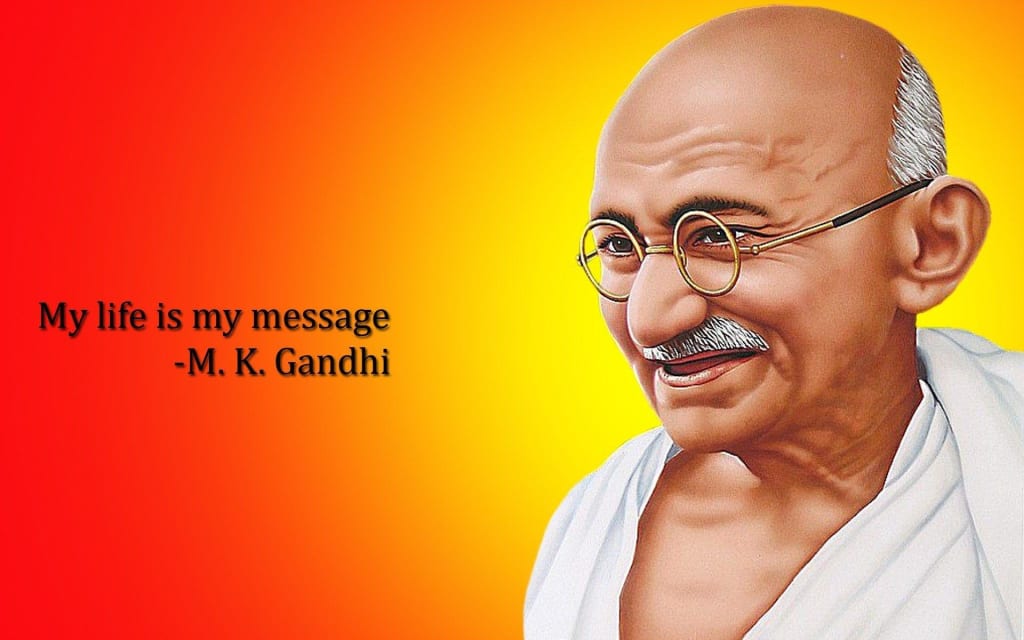Mahatma Gandhi
Mahatma Gandhi, byname of Mohandas Karamchand Gandhi,

Indian lawyer, politician, social activist, and writer who became the leader of the nationalist movement against the British rule of India. As such, he came to be considered the father of his country. Gandhi is internationally esteemed for his doctrine of nonviolent protest (satyagraha) to achieve political and social progress.
In the eyes of millions of his fellow Indians, Gandhi was the Mahatma (“Great Soul”). The unthinking adoration of the huge crowds that gathered to see him all along the route of his tours made them a severe ordeal; he could hardly work during the day or rest at night. “The woes of the Mahatmas,” he wrote, “are known only to the Mahatmas.” His fame spread worldwide during his lifetime and only increased after his death. The name Mahatma Gandhi is now one of the most universally recognized on earth.
Youth
Gandhi was the youngest child of his father’s fourth wife. His father—Karamchand Gandhi, who was the dewan (chief minister) of Porbandar, the capital of a small principality in western India (in what is now Gujarat state) under British suzerainty—did not have much in the way of a formal education. He was, however, an able administrator who knew how to steer his way between the capricious princes, their long-suffering subjects, and the headstrong British political officers in power.
Gandhi’s mother, Putlibai, was completely absorbed in religion, did not care much for finery or jewelry, divided her time between her home and the temple, fasted frequently, and wore herself out in days and nights of nursing whenever there was sickness in the family. Mohandas grew up in a home steeped in Vaishnavism—worship of the Hindu god Vishnu—with a strong tinge of Jainism, a morally rigorous Indian religion whose chief tenets are nonviolence and the belief that everything in the universe is eternal. Thus, he took for granted ahimsa (noninjury to all living beings), vegetarianism, fasting for self-purification, and mutual tolerance between adherents of various creeds and sects.
Get a Britannica Premium subscription and gain access to exclusive content.
Subscribe Now
The educational facilities at Porbandar were rudimentary; in the primary school that Mohandas attended, the children wrote the alphabet in the dust with their fingers. Luckily for him, his father became dewan of Rajkot, another princely state. Though Mohandas occasionally won prizes and scholarships at the local schools, his record was on the whole mediocre. One of the terminal reports rated him as “good at English, fair in Arithmetic and weak in Geography; conduct very good, bad handwriting.” He was married at the age of 13 and thus lost a year at school. A diffident child, he shone neither in the classroom nor on the playing field. He loved to go out on long solitary walks when he was not nursing his by then ailing father (who died soon thereafter) or helping his mother with her household chores.
He had learned, in his words, “to carry out the orders of the elders, not to scan them.” With such extreme passivity, it is not surprising that he should have gone through a phase of adolescent rebellion, marked by secret atheism, petty thefts, furtive smoking, and—most shocking of all for a boy born in a Vaishnava family—meat eating. His adolescence was probably no stormier than that of most children of his age and class. What was extraordinary was the way his youthful transgressions ended.
“Never again” was his promise to himself after each escapade. And he kept his promise. Beneath an unprepossessing exterior, he concealed a burning passion for self-improvement that led him to take even the heroes of Hindu mythology, such as Prahlada and Harishcandra—legendary embodiments of truthfulness and sacrifice—as living models.
In 1887 Mohandas scraped through the matriculation examination of the University of Bombay (now University of Mumbai) and joined Samaldas College in Bhavnagar (Bhaunagar). As he had to suddenly switch from his native language—Gujarati—to English, he found it rather difficult to follow the lectures.
Meanwhile, his family was debating his future. Left to himself, he would have liked to have been a doctor. But, besides the Vaishnava prejudice against vivisection, it was clear that, if he was to keep up the family tradition of holding high office in one of the states in Gujarat, he would have to qualify as a barrister. That meant a visit to England, and Mohandas, who was not too happy at Samaldas College, jumped at the proposal. His youthful imagination conceived England as “a land of philosophers and poets, the very centre of civilization.” But there were several hurdles to be crossed before the visit to England could be realized. His father had left the family little property; moreover, his mother was reluctant to expose her youngest child to unknown temptations and dangers in a distant land. But Mohandas was determined to visit England. One of his brothers raised the necessary money, and his mother’s doubts were allayed when he took a vow that, while away from home, he would not touch wine, women, or meat. Mohandas disregarded the last obstacle—the decree of the leaders of the Modh Bania subcaste (Vaishya caste), to which the Gandhis belonged, who forbade his trip to England as a violation of the Hindu religion—and sailed in September 1888. Ten days after his arrival, he joined the Inner Temple, one of the four London law colleges (The Temple).
Sojourn in England and return to India of Mahatma Gandhi
Gandhi took his studies seriously and tried to brush up on his English and Latin by taking the University of London matriculation examination. But, during the three years he spent in England, his main preoccupation was with personal and moral issues rather than with academic ambitions. The transition from the half-rural atmosphere of Rajkot to the cosmopolitan life of London was not easy for him. As he struggled painfully to adapt himself to Western food, dress, and etiquette, he felt awkward. His vegetarianism became a continual source of embarrassment to him; his friends warned him that it would wreck his studies as well as his health. Fortunately for him he came across a vegetarian restaurant as well as a book providing a reasoned defense of vegetarianism, which henceforth became a matter of conviction for him, not merely a legacy of his Vaishnava background. The missionary zeal he developed for vegetarianism helped to draw the pitifully shy youth out of his shell and gave him a new poise. He became a member of the executive committee of the London Vegetarian Society, attending its conferences and contributing articles to its journal.
In the boardinghouses and vegetarian restaurants of England, Gandhi met not only food faddists but some earnest men and women to whom he owed his introduction to the Bible and, more important, the Bhagavadgita, which he read for the first time in its English translation by Sir Edwin Arnold. The Bhagavadgita (commonly known as the Gita) is part of the great epic the Mahabharata and, in the form of a philosophical poem, is the most-popular expression of Hinduism. The English vegetarians were a motley crowd. They included socialists and humanitarians such as Edward Carpenter, “the British Thoreau”; Fabians such as George Bernard Shaw; and Theosophists such as Annie Besant. Most of them were idealists; quite a few were rebels who rejected the prevailing values of the late-Victorian establishment, denounced the evils of the capitalist and industrial society, preached the cult of the simple life, and stressed the superiority of moral over material values and of cooperation over conflict. Those ideas were to contribute substantially to the shaping of Gandhi’s personality and, eventually, to his politics.





Comments
There are no comments for this story
Be the first to respond and start the conversation.